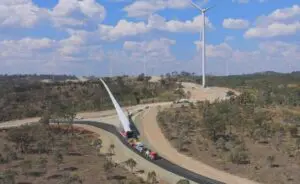 The Australian renewable energy industry has reacted to the RET Review Panel’s recommendations with grim warnings – from sugar milling, to wind farms, to turbine manufacturers and module assembly.
The Australian renewable energy industry has reacted to the RET Review Panel’s recommendations with grim warnings – from sugar milling, to wind farms, to turbine manufacturers and module assembly.
The RET Review’s modelling has highlighted the winners and losers of repealing the RET; black coal revenue increases 65 percent, wind decreases 81 per cent and solar revenue decreases 90 per cent.
Here is a round-up from some of the reactions:
Tindo Solar:
The Adelaide-based solar module manufacturer said the proposals will kill the solar panel and wind industries and reward “antiquated” black coal. Spokesman Richard Inwood, said: “They have given us two options. The first option is to scrap residential and commercial solar subsidies effective immediately and the second option is to slash commercial solar subsidies by 93 per cent and residential subsidies by a third.”
“On the back of this bipartisan long term policy and in good faith, the founders of Tindo decided to start up what is now Australia’s last remaining solar panel manufacturer ….. Uncertainty is a killer for business. Tindo hopes a response confirming the continuation of the RET unchanged is forthcoming swiftly from the Government inline with its pre-election promises and commitments.”
Senvion Australia:
The wind farm developer, which has invested over $2.5 billion in 18 wind farms across Australia based on the support for the RET, described the panel’s recommendations as “reckless, short term and visionless”.
Chief executive Chris Judd said a $1.5 billion wind project in South Australia (Ceres, on Cape York), which could provide power equating to 15 per cent of the state’s demand, was now “up in the air” due to the review outcomes.
“The recommendations will wreck private investment and a clean energy industry that have been fundamental in helping … cut pollution, lower power prices and transition to a modern economy”, Judd said, adding that Australia should be “open for business … instead of turning its back on billions of dollars of private investment”.
The Australian Sugar Milling Council (ASMC):
ASMC Chief Executive Officer, Dominic Nolansaid that although some recommendations are misguided “the report has finally put to rest the myth that the RET increases electricity prices… only account(ing) for around four per cent of the best household electricity prices.”
Nolan has urged the “Australian Government to conclude that the risk of attempting to destroy the integrity of the RET scheme is too significant, in terms of regional jobs and energy market competition.”
Voluntary Carbon Markets Association:
The group has called the report of the government’s recent RET Review as “misguided, uninformed and just plain silly” in the way it recommends treating voluntary schemes.
The RET Review recommends that voluntary schemes should now be included in the calculation of Australia’s mandated target. The VCMA says this will effectively be the death of schemes such as GreenPower, where customers pay extra to increase the percentage of renewable energy that they consume.
It warns that removing this incentive to create “additional” renewable energy would create a “flight of capital” leaving the country, as occurred when similar carbon offset scheme were affected.
“The concept of “additionality’ is well understood within voluntary schemes worldwide where anyone wishing to make an environmental claim cannot do so if their actions are simply being used by a government to reduce the impost on other regulated entities,” it says. “Ironically if the government accepts the RET Review’s recommendation, local, state, and federal government agencies currently making claims under its own National Carbon Offset Standard, will find that such claims are no longer legitimate.
Pacific Hydro:
The renewable energy developer warned that if the panel’s recommendations were adopted, it would focus its investments on international markets such as Latin America.
“The report essentially recommends a winding back of the target, which would result in higher energy prices for consumers over the longer term, a substantial increase in greenhouse gas emissions – resulting in economic costs down the track – and pulling the rug out from underneath communities who need this investment most,” general manager Lane Crockett said.
“We very much hope that a reasoned bi-partisan approach to renewable energy investment can continue to be supported so that Australian and international investment can once more be directed towards renewable generation for the future economic benefit of Australians.”
Doctors for the Environment Australia:
The medical lobby group warned that the findings of the long-awaited Government commissioned review to prune back or abolish the Renewable Energy Target will put the public at greater risk of illness and death, as well as place a greater cost burden on the healthcare system.
Doctors for the Environment Australia spokesperson, Dr George Crisp, said: “The significant cost to the health system of continued fossil fuel use, particularly in terms of air pollution, was not taken into account in the review”.
The cost of health care associated with coal fired power generation emissions has been conservatively estimated at $2.6 billion a year in Australia.
Currently, long-term exposure to fine particulate pollution accounts for 1590 deaths in Australia’s four main cities every year, more than the national road toll.
“When you account for public health, the notion that coal is cheap is just pure nonsense,” says Dr Crisp. “Unfortunately, it’s the public- especially children, those with chronic illness and the elderly- who will inevitably pay the price.”
Keppel Prince:
The Victorian manufacturer, which makes wind turbine towers, said the recommendations of the RET will devastate the industry and could force it to dump 170 jobs.
Steve Garner, a wind turbine manufacturer from Keppel Price Engineering, said that new wind farms would not be constructed if recommendations were adopted. “It really does spell the end of the renewable energy business for us, who would want to or what investors would be out there when there’s no support from the Government?”










